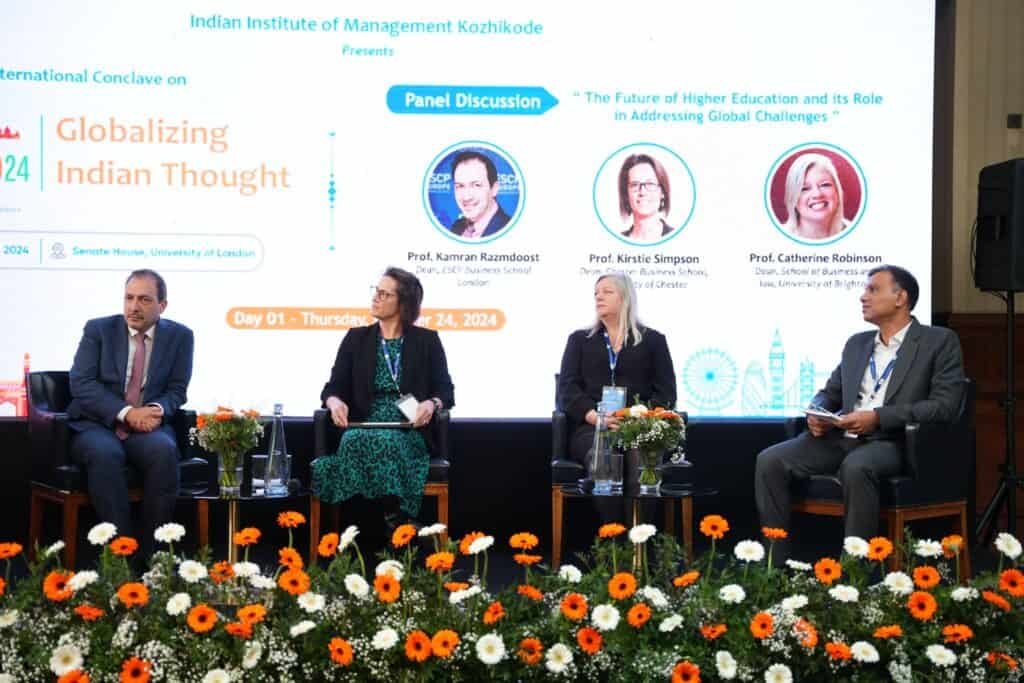The director of Indian Institute of Management Kozhikode – a prestigious business school based in the state of Kerala – has called out global rankings metrics that might penalise an institution like his for not being as “internationalised” as Western institutions.
Director, Debashis Chatterjee, pointed out that in a country with 1.4 billion people – and with an acceptance rate at his business school of one student in 800 applications – it seemed wrong to be marked down on rankings metrics when it comes to being an “internationalised” business school.
“India has to respond to this whole construct of internationalisation in a very, very reasonable way,” he told The PIE News, noting that IIM Kozhikode is on the cusp of becoming triple-crown accredited via Equis, AMBA and AACSB.
“The trajectory through which the Western schools have evolved in internationalising their curriculum, and all of that, makes little sense if you look at a continent called India,” said Chatterjee, who said he was engaging with Equis on this point.
He outlined a scenario: “There’s a guy who was born in Germany, educated in England, working in France. He’s called an international student. In India, there’s a person from Kashmir who gets educated in New Delhi, works in Mumbai but he is not international.
“These three states are as different as chalk from cheese. Yet we are not counting their diversity.”
The second challenge that Chatterjee outlined was evaluation of research output. Being offered the chance to collaborate on research and be cited in publications or journals considered in rankings metrics was not serving India well, he claimed.
“We want research to be solving the problems of our country,” he said.
He argued that accreditors need to “unleash the the control systems that tell us to internationalise more” – and consider the constraints in which institutions operate.
“We should internationalise in our own way,” stated Chatterjee, noting that India has a sixth of the world’s population and a huge diaspora IIM would like to reach – as well as GDP output on track to be “third in the world”.
“That’s also our commitment: that we have to get our diaspora a chance to study at great Indian institutions, right? And so you can see the challenge of a country which is as big as that, as populous as that, is different from the challenge of a smaller country.”
Chatterjee spoke to The PIE following a London event, Globalising Indian Thought, organised by IIM Kozhikode with Bridge India.
“Globalising Indian Thought doesn’t mean that I’m raising a red flag of rebellion, but I’m simply asking a very legitimate question,” observed Chatterjee.
India is already an international country. I can bet that the average American student knows a lot less about India than an Indian student knows about America
Debashis Chatterjee, IIM Kozhikode
He argued that higher education should not have a “cookie cutter method of decoding” quality in higher education.
“India is already an international country. I can bet that the average American student knows a lot less about India than an Indian student knows about America.”
Staging the event in the UK was a way of elevating this conversation on a global level, he said.

“The reason why we [held the event] in London is to showcase that this is happening,” Chatterjee said, observing a position that is “the legitimacy of a nation which is colonised for 100 years will only come when the colonisers say, you are good enough”.
He added: “I represent one sixth of the world’s population as an Indian and in IIM I admit one out of 800. I mean, I am 1.001% of the intellectual capability of India. If I can’t globalise Indian thought, who can legitimately do so?”
As well as calling for more nuance from global rankings organisations, the business school leader nodded to the creation in India of NIRF – a homegrown Indian ranking for higher education, almost 10 years old.
“A company would measure its products, its value based on its own barometers, not on somebody else’s,” he observed. “So we would like to do that. But at the same time, I will say that I respect international rankings because this tells us where others are in the pecking order.
“So I’m not dismissing the ranking institutions. All I am I’m saying is they still have to nuance their measures.”
A company would measure its products, its value based on its own barometers, not on somebody else’s
Debashis Chatterjee, IIM Kozhikode
The event included a conference at the University of London, as well as a dinner at the Lord’s Cricket Ground with over a hundred IIMK alumni in London.
IIM Kozhikode is one of India’s premier management institutes. Set up in 1996 by the government of India in collaboration with the state government of Kerala, it is the fifth IIM to be set up.
As early as 2013, its flagship management program was 54% female, at a time when other leading business schools in India had a participation rate of 8-10% female.
Debashis Chatterjee is a keynote speaker at The PIE Live India in Delhi, January 31.
The post Rankings & research metrics need adjustment for India, says IIM leader appeared first on The PIE News.


